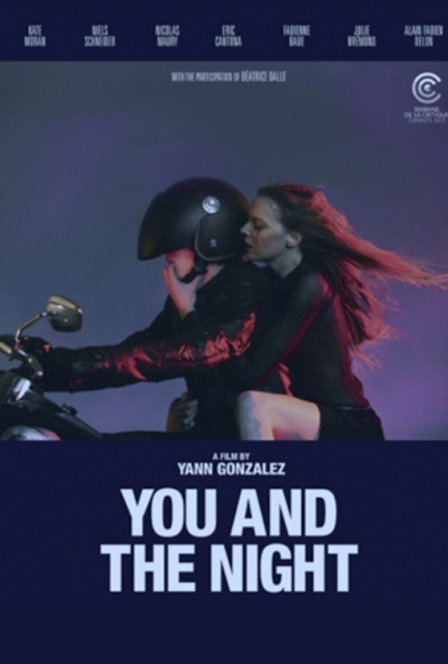When I was 17, my favorite song was “No I in Threesome” by Interpol. Y’see, my high school girlfriend had recently dumped me, and the song — a male fantasy in which Paul Banks argues that a relationship can be saved if the couple engages in a (presumably MFF) threesome — appealed to my naivety and horniness. (Thankfully, I never tried to pursue that option to save my relationship.) While I still think the song is groovy, I now realize how laughably idiotic it is. You and the Night is the first film from writer/director Yann Gonzalez (the brother of M83’s Anthony Gonzalez, who composed the film’s soundtrack). It uses Paul Banks’s logic to tell the story of a young couple that hosts orgies to keep their desire and love for one another alive throughout their eternal lives. It’s a lazy construct employed to make a movie about love, eternity, and most importantly, arousal.
You and the Night is a film that attempts to be transgressive and dirty and confrontational about sexuality but is afraid to actually be so. Despite the presence of both male and female nudity (and a guy getting a facial from a girl!), the film feels tame, afraid of offending its audience. The result is full of re-treads that more closely resembles bad erotica than the challenging sexuality of say, Dogtooth.
Anthony Gonzalez’s soundtrack is predictably impressive, but only ends up further harming the film. M83 have always had a flare for excessively dramatic and epic compositions (some even incredibly cinematic). But even in these subdued, restrained instances they lend an overwhelming weight and seriousness to some scenes in which not all that much happens.
The music seems further out of touch given that the film is being marketed as a “sex comedy,” a description I really don’t understand. I don’t intend this as an overt barb at the film (except I do), but You and the Night isn’t funny. And it’s not that it makes jokes that miss; it’s that it doesn’t seem to be making jokes. Sure, there’s a scene in which a shot of the couple embracing nakedly is superimposed over an image of the stars, and I see how this might be considered campy. But it doesn’t feel that way. It’s almost as if the producers realized how bad the film was, and decided that if they said in their marketing materials that the film didn’t take itself seriously, no one else would have to take it seriously either. The closest the film comes to a sex comedy is its similarity with Pasolini’s Trilogy of Life. While the You and the Night’s limited frame narrative and anthology format doesn’t contain the ribald humor of Chaucer, it does sometimes share Pasolini’s explicitness.
None of this would be a problem if the film had interesting characters or events, but none are to be found here. Even the mise-en-scène is dull, as Gonzalez and cinematographer Simon Beaufils repeatedly fail to create appealing or dynamic shots. What’s left is a film as eye rolling, obnoxious, and false as a fake orgasm.

